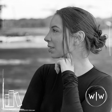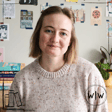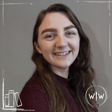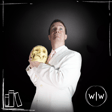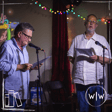Become a Creator today!Start creating today - Share your story with the world!
Start for free
00:00:00
00:00:01

249 Nina Millns | Author, Playwright, Screenwriter and Audio Writer
Author, screenwriter and playwright, Nina Millns joins us this week to chat about writing across different disciplines, working with the Dr Who team, finding her agent and then losing her and ultimately reconnecting with her, and our shared love of Ursula K. Le Guin.
Support the show on Patreon! 💖 And get extended episodes, ad-free and a week ahead of everyone else. 🙏
For audio listeners:
Listen to The Chosen Ones and Other Tropes, Jamie's other podcast with Melissa Welliver and Naomi Gibson! 📚
Follow on socials! 🥳
Transcript
Introduction of Nina Milnes
00:00:00
Speaker
Oh, a spicy question. love it. Because the writing sort of everything, right? Like you can fix plot holes, but if the writer... So some readers love that and some readers are like, but I wanted more of this. So it's kind of, it's kind of a gamble.
00:00:14
Speaker
Hello and welcome back to the Right and Wrong podcast. On today's episode, I am joined by an author, screenwriter, playwright, and if her online bio is correct, trained clown.
Nina's Novel: 'Say You'll Be There'
00:00:26
Speaker
It's Nina Milnes. Hello.
00:00:28
Speaker
Hello Jamie, lovely to be here. I love that intro. Thank you. Well, you're welcome. I had to mention it. I saw it on your bio and i was like, well, we've got to talk about, we'll talk about it later because top of the episode, we always start with your latest works, which is your second novel, Say You'll Be There.
00:00:47
Speaker
Tell us a little bit about it. Yeah. So Say You'll Be There is about four friends growing up in the 90s who become friends because they dress up as the same Spice Girl for Red Nose Day.
00:01:00
Speaker
And it's all about how they are faced with so many challenges and trials and tribulations as they kind of grow up in their teenage years. And then there's a second timeline that which is about the three of them ah coming together when one of the friends disappears.
00:01:20
Speaker
So they kind of reunite to find out what happened to their friend and kind of ah bring back lots of old memories and ghosts from that time that cause a lot of trouble.
00:01:33
Speaker
Okay. Well, I love the Spice Girls as a jumping off point.
00:01:39
Speaker
That's, that's always fun. Brings back memories. Probably ages me a bit, but that doesn't matter. You and me both, Jamie. um Awesome. um Sounds brilliant. That is going to be out on the 25th of September.
00:01:53
Speaker
And for everyone listening, you can get your hands on it then.
Writing Across Mediums
00:01:56
Speaker
um As someone who I mentioned at the top of the the episode, you know, you you don't just write prose, you you've done screenwriting, playwriting, all sorts of writing as someone who writes across different mediums.
00:02:11
Speaker
you Is there like a plan or a methodology when it comes to storytelling? Is it is it sort of universal or do you need to do a completely different approach for everything? That's a great question. and So annoyingly, the answer is kind of yes and no. okay i love the fact that I get to work across a number of mediums.
00:02:31
Speaker
um And that includes audio and radio as well, which I really am passionate about. and And I think the way it kind of works is that i I've just got so many stories I want to tell. and And it's kind of fun trying to figure out which is the best medium to write it for.
00:02:49
Speaker
And actually this one, Say You'll Be There, is is a story that I wanted to tell for years. And I found an old copy from about 10 years ago of just the beginning, the opening scene, which obviously evolved quite a lot.
00:03:02
Speaker
But then a few years later, I pitched it as a play. And then finally, we decided it was going to be book two. so it kind of gives you an idea of the fact that, you know, sometimes these same stories cross mediums.
00:03:16
Speaker
And my first book has been optioned for TV as well. You know, so it's it's interesting when that evolves and, you know, the story and the characters feel malleable enough to kind of be considered for different mediums.
00:03:29
Speaker
um But then what happens is you've got the discipline and ah the kind of very unique experience for writing either a script for TV, audio or theatre or an entire book.
00:03:46
Speaker
um And that is obviously very, very different. And the discipline of it is very, very different. The structure, and the process and also just honouring those mediums. I mean, the reason I'm so kind of obsessed, say, with audio is that I got to work with some of the people at the top of their game in that field. And I was just in awe of the worlds that they were able to build, you know, just sonically. um And that was something that I really didn't appreciate until I was doing it and kind of learning on the job.
00:04:17
Speaker
um And it's the same, you know, with with other mediums, you know, you can imagine what that's like for theatre. And then again, you know, for for novels. and So kind of really honouring and respecting each medium and its potential and the people who are kind of masters at it, um I think is is, you know, part of the process as well.
00:04:38
Speaker
Yeah. And when you say audio, do you mean like radio plays? I do. Radio plays and series. So um I wrote a series for BBC Sounds. I've been super, super lucky to write a couple of episodes for the audio series of Doctor Who, et cetera, et cetera.
Opportunities in Audio Storytelling
00:04:58
Speaker
And it really is just i a great...
00:05:02
Speaker
um community to kind of work for because they're very inclusive very welcoming very warm and very open to new voices um because i think say for tv for example there's so much money in such a huge budget that you know more and more they're taking less and less risks and kind of choosing safer options you know well-known established writers whereas what I found for audio is that you know because they can create these huge worlds you know just with a few lines of description and and layers of sound um it's it's not as massive a risk you know to kind of open their doors to to new voices and so i was really grateful for that opportunity as well
00:05:46
Speaker
Yes. I recently had um Leanne Slade on the podcast and she is an author who's, who's signed her kind of initial break into publishing is all with audible.
00:05:57
Speaker
And wow so much of the, so she, she's not yet in print, but she, she will have four. and She has four novels like in the works, well, two out, I think, but she's not in print yet. And and the reason that, that like that can function so quickly and so effectively and is like you said, there's not a huge,
00:06:16
Speaker
physical print run involved it's to do audio it requires relatively few people and they can do it relatively quickly so i see why they're willing to take bigger risks and bigger swings on something that's strictly audio because there's yeah there's there's less moving parts going on which they need to worry about Absolutely. And what an awesome way of doing it like that way around. I love that.
00:06:39
Speaker
And I love that there's that option now, you know, like I just think the traditional way of of doing things and getting into writing or publishing or what have you, you know, there's there's more and more and kind of angles in almost, which I think is makes just makes it more accessible.
00:06:57
Speaker
Yeah, absolutely. Because she was saying like, that's not how she'd imagined, you know, her career as an author going. But she was like, I see it. It's been great. And I see it more as like, um traditionally, an author would have their book in paperback first. And then like, it would be exciting down the line to then have the audiobook come out. But she's like, I'm just doing the other way around.
00:07:17
Speaker
we're going to have what We're going to have the paperbacks come out at some point. and We just did the audiobook first. And I was like, yeah, that's a great way of looking at it. It really is. Yeah. Good on her. That's awesome. And I'd be really interested to to find out, you know, what that means in terms of accessibility to her work, because I imagine that loads of people access it, loads of people listen, you know, which is just great. You know, your stories are being heard. And that's what we want at the end of the day for people to to read or listen or watch, you know, our stories. So good on her.
00:07:49
Speaker
And obviously she's, you know, she's signed by the platform that is like one of the biggest audiobook distributors. So they can really push her as much as they would like to. And they've, I think it's through Audible. She's had the most incredible um narrators.
00:08:05
Speaker
She's had like Sam Claflin, Daisy Edgar Jones, just amazing. Oh, wow. Yeah. that I mean, that's a dream, right? Yeah, exactly.
00:08:15
Speaker
But getting back onto you, I have to ask, because since you mentioned Doctor Who, when you work, on like an ip like that a franchise like that is this is there sort of like um strict rules or guidelines or like kind of ah a tablet of law where they're like so this is the rules and you have to just stay within all the lines or do they kind of give you more free reign with it Again, it's kind of a yes and no answer,
Writing for Doctor Who Audio Series
00:08:44
Speaker
annoyingly.
00:08:45
Speaker
and I mean, what I would say firstly is that it was such a a warm and welcoming and open kind of team that I was working with. and it was The way I got into it because I think that's also helpful for people to know, is that and my first play, Delete, was turned into an audio play and by a brilliant kind of indie company called Wireless Theatre that make lots and lots of great audio.
00:09:11
Speaker
and mostly audio plays, but, you know, comedy and series as well and have won loads of awards. And they took my play and turned it into an audio play. And the director was a brilliant person called Robert Valentine, who is just an audio king, really. He's such a whiz and he's worked on everything.
00:09:31
Speaker
And because he liked my play, he kind of got me in you know, and said, look, would you be interested in kind of working with Big Finish, which is the company that makes the audio kind of episodes of of all the spin offs from Doctor Who.
00:09:46
Speaker
um And I was so chuffed. And then the well, I did two different ones. One was an international women's ah special, ah International Women's Day special.
00:09:58
Speaker
with lots of great female characters from from the Hooniverse, as they say. never heard that. That's fun. Oh, yeah, you've got to get with all the jargon if you're going to do it. and And then the other was a historical kind of setting.
00:10:13
Speaker
um And the funny thing was when I was pitching ideas for the historical setting, and they really said, you know, just just think of any time in history or or any era or any race or, you know, something that really resonates with you and we can write a story for it.
00:10:25
Speaker
But everything I pitched, of course, they'd done before because, you know, the the kind of the canon and the legacy is just so huge, you know. So I'd pitch one thing about the Egyptians and they'd say, oh, no, we've done that.
00:10:38
Speaker
Medusa. Yeah, there's five of those. Sorry. um And eventually we came up with, and I think in the end it was um rebellious female Irish pirates. And they said, oh, no, I think I think that's going to be OK. I don't think we've done that that before.
00:10:54
Speaker
um which was great because then I went away and kind of researched them all. But to your point, so they were very open for me to kind of pitch storylines and ah kind of historical settings and even just general settings.
00:11:07
Speaker
um But there are just a lot of kind of and rules about Doctor Who himself, the character, um and what does and doesn't happen and what kind of the structure of the storyline is.
00:11:21
Speaker
um you know, the themes and issues that they try to explore. And I love all that because um it it helps contain what I'm doing, but it's also a challenge. It's like, okay, ah you know, I didn't actually even realise that he never attacks anyone. He never uses violence to achieve his aim.
00:11:39
Speaker
And so I was like, well, yeah, he can just obliterate all the bad aliens. And they were like, no, no, no, no no he never does that. oh okay, right, okay. So, you know, I had to go back and be cleverer than that kind of thing.
00:11:51
Speaker
and And also that the villains, you know, often have much more nuance and than that, you know, that there's a reason that they seem to be the baddies and that their motivation is is, you know, complex and deep and...
00:12:04
Speaker
and, um you know, almost rational, if you see what I mean. um So I really liked that. I found that, first of all, very educational, but also just a great challenge to write for.
00:12:17
Speaker
and And I got a lot of help. I made a lot of mistakes. There was a lot of trial and error. and But I'm so proud of what we what we created in the end. Okay, that's so interesting. I'm, I'm a big believer in the the idea that like creativity thrives with restriction.
00:12:34
Speaker
So it sounds like with those kind of restrictions and kind of the having to like check whether things were okay, or how things work. It sounds like you you learned a lot through that experience.
00:12:44
Speaker
Oh, loads, loads and loads. Yeah, absolutely. And you know, As writers, you know, one of the things that we also want to do as well as tell our own story is hopefully collaborate with others, get a chance to write for these established kind of storylines or series or what have you, you know. and And so that discipline of working within a world and the rules of that world and the rules of the characters in that world, I think is is just just very good discipline, like you said.
00:13:14
Speaker
Yeah, absolutely. Especially if it's not something that you are used to doing, like working with a ah big, broad universe that kind of spans far beyond what you're kind of doing and in that instance.
00:13:24
Speaker
Absolutely. Yeah. Yeah. Getting back onto you then, um we kind of touched on different writing styles. It's like same but different.
00:13:35
Speaker
I imagine an easy way to say is there's a lot of transfer transferable skills, but each medium has its own nuances and quirks that you need to kind of unlearn some things for and then remember to do other things for.
00:13:49
Speaker
Yeah, really well put. Yeah. And again, like, I just find that such a fascinating and exciting challenge. and Yeah, like, I don't want to be too toxically positive. But I mean, you know, obviously, there are times where, you know, I'm sent back my 10th draft, and I'm like, how is it still not right? You know, and and I'm not so, so happy about those challenges then. But in general, you know, just the the gift of being allowed to work across so many mediums as a storyteller, it's always going to be a positive thing.
00:14:24
Speaker
So then if, if your challenge is that you need to learn to master each one, and like you said, you know, the nuances that come with it that can only be a positive, you know, but job to be asked to do, if you see what I mean. Yeah.
00:14:40
Speaker
So, yeah, I love that. I think it's, it's just great training, you know. Yeah.
Character-Driven Narratives
00:14:46
Speaker
Okay. That's great. The question I love to ask people when it comes to like craft and stuff is, is always, are you a,
00:14:54
Speaker
a planner or a pantser but i I wonder if that maybe depends on the medium you're writing for well it really does yeah because I'm very naturally pantser um because what I think happens is that I have I think a lot of my stories start from character I have a character and ah who i want to follow, you know, through their kind of trials and tribulations and journeys.
00:15:24
Speaker
And then I kind of think very carefully about the context in which they're living and how that context can kind of impinge on their freedom and their dreams and hopes. and And I try always, I think, for all my stories, and this includes absolutely everything I've written, for it to have something to say about the times that either we're living in or the times that they're living in.
00:15:49
Speaker
and And ah so it's a human story, but hopefully has a message about the broader world, you know, that it's set in. um And so what I find is that although, you know, I may have really quite clear ideas about that character and maybe even the issues that I kind of want to explore, i often don't know what's going to happen at the end. And they do take over the characters and they kind of, you know, lead me along. And I do find it going in all sorts of, you know, interesting ways.
00:16:21
Speaker
directions however that's fine when it's just you in your bedroom typing away and no one's expecting anything of you but you know especially for for audio um and tv um that's a big investment you know and people really want to know what the hell you're doing and where the hell this is going so you often have to write outlines or treatments And that might evolve, you know, that can change. So what I found is at first I felt a bit kind of grumpy um and rebellious about having to, you know, put it all down.
00:16:55
Speaker
um And that that was probably the thing that felt the most restrictive because i it kind of went against this natural kind of process that I found myself kind of working in.
00:17:07
Speaker
But... what I realized is that it's okay. You know, that doesn't mean it's, it's set in stone and it probably will evolve. And and if it's good, it, it will improve and it will change and, you know, and it it will have other but people's input.
00:17:22
Speaker
um so, you know, just, just get something down that is, is workable and then quite literally work on it. Yeah. You, you can't edit a blank page as they say.
00:17:34
Speaker
Exactly. Yeah. Yeah. Okay. You mentioned that, uh, goddesses has been optioned for TV as someone who, I mean, fingers crossed first of all,
Adapting 'Goddesses' for TV
00:17:46
Speaker
that it finds a home in a studio. I know being optioned for TV is just the first step and then you still need lots of other things to come together.
00:17:53
Speaker
Yes. But, If it does um move into like a production point, as someone who writes for television, for screen, will you be, will you want to be involved with the and ah adapting the script for that?
00:18:08
Speaker
That's a great question. Again, yes and no. I'm a scene here. know. um Of course, you know, there's a part of me that does want to, you know, jump on on board and and be the one to kind of write it for TV for a number of different reasons. You know, a it would be awesome to do it. and And B, there's probably a controlling side of me that would then, you know, want to have it exactly the way I want it.
00:18:35
Speaker
Yeah. And that is a you know that is a discussion that we've had with you know several kind of different indies and and kind of people in the industry. i think there are but positives and negatives to that. you know Goddesses was my first novel and it took me years and years to write and and there was a lot of trial and error.
00:18:57
Speaker
And, you know, in fact, talking about different mediums, Because it was my first book, my first draft of that book was only about 40,000 words. And my agent said, look, Nina, this is really just a big script. Like, it's not really a book. Like, there's a lot of dialogue and there's a lot of action, but there's no kind of...
00:19:19
Speaker
you know, internal kind of revelations about what the characters are thinking or feeling, you know, or, you know, detailed description or anything like that. So just go back, you know, expand, expand, expand. And I thought, what? forty thousand words made that's It's That's loads. Like there's no more words left in the world. There's nothing left to say.
00:19:38
Speaker
And then of course I went back and you know, learn how to expand. and But I think with that, you know, because it was the first one, obviously, you know, you lose perspective because you're so close to it. And, you know, you've you've kind of gone on such a big journey with it. And so i think then being able to get a sense of what really works in terms of adapting it for TV and,
00:20:05
Speaker
You need the right team around you and you need a different perspective. And, you know, I think what was lovely was the conversations I was having were so interesting because they were talking about kind of characters on the margins that were only briefly mentioned or or incidents that, you know, were only brushed away.
00:20:24
Speaker
ah you know, kind of very briefly, you know, brushed alongside kind of thing, becoming these whole scenes, you know, and these whole kind of threads, you know, that could be expanded on.
00:20:37
Speaker
um And that was way beyond anything I imagined myself, you know. So I thought, OK, I now see the merit in also placing this in in somebody else's hands who has a different vision for it and a different perspective,
00:20:51
Speaker
So, you know, we don't know yet. It may be that there'll be a writer's room that i can be a part of. It may be that I'm the lead writer. to It may be that someone else is. And at this moment, I'm kind of open to it all, to be honest.
00:21:04
Speaker
Yeah. Okay. And it is a much more, my understanding is that screenwriting is a much more collaborative art form. And it's it's rarely ever one person. It's usually like a team of people.
00:21:15
Speaker
Yeah, definitely. Yeah. You've got a whole team. ah Yeah. and You've got like, so many people that that are kind of part of the team and rightly so, you know, I've already been part of some brainstorming ideas and it's just been really rich, you know, what's coming up and the different angles. And of course, you know, things like even starting the entire series, you know, with a scene which actually comes right at the end of the story.
00:21:40
Speaker
And then tracking back to find out how we got there. You know, i would never have thought of that. and yeah So, you know, I love that. And it kind of feels like we've got all this material to play with and all these brilliant minds, you know, that are coming up with ways of of kind of and presenting it in in a fresh way.
00:22:00
Speaker
Yeah, I mean, adaptation is a skill unto itself, what no matter what medium you're translating to. Just someone being able to take one thing and then translate it to fit another medium, figuring out where to kind of change it and kind of move things around. That's such a skill.
00:22:18
Speaker
Yes. i think there's plenty I can think of plenty of adaptations which are not good. So yeah I'd be happy to find, yeah, to find it when when you find a good adaptation, like a Jurassic Park or something, and you're like, wow, they could not have done this better, I don't think. Yeah.
00:22:35
Speaker
One medium to the other. Oh, you're so right. Yeah. and And because there's so many that aren't great, um you know, i think there's so much respect for those who do it well, you know, because it is hard. And again, it is such a skill. And i I'm just so inspired, but also fascinated, you know, by by how people do that and and what the kind of the learning is there, you know.
00:23:00
Speaker
Yeah, yeah, absolutely. um Well, fingers crossed, fingers crossed that sometime in in the future, we we we can see goddesses on on on a screen somewhere.
00:23:10
Speaker
Thank you. Before we get to the desert island, I just had one more question. And that was, um I saw that you're a member of various different groups, writing groups, and and you do some mentoring as well. In in light of that,
00:23:25
Speaker
I wanted to, I wonder if there's like a ah most common piece piece of advice that you like to share with aspiring um writers.
Advice for Aspiring Writers
00:23:34
Speaker
Oh yeah. I'm so passionate about this. I absolutely love Working with other writers, I love teaching. and It's something that I will always do alongside my own writing.
00:23:47
Speaker
and And kind of working with other people's work is such a privilege. and And I often get even more passionate and excited about other people's projects and invested, very, very invested um in making it as good as it can be, like guess.
00:24:04
Speaker
There's a few things. I think, you know, it's probably stuff people have already heard, but I think you need to just do it, you know, and it will be a bit shit. And that's okay. You know, like, understand that, you know, everyone starts somewhere and you will need to improve on it.
00:24:21
Speaker
But until you get it down, as you said, you know, you can't edit a blank page and there's, you know, we want something for you to to be able to work with. The second thing is to also, you know, get that balance between really investing in, you know, whatever project you're working on at the moment, but really have an eye on other stories that you want to tell and see if you can have a few different things developing at different stages.
00:24:46
Speaker
Because I think working towards being prolific, even though that takes a lot of time and, you know, having time is a real privilege, Having a body of work makes you more trustworthy and people will take, you know, more and more risks with you because they know you're not just kind of a one trick pony.
00:25:05
Speaker
But also it makes you a better writer, you know, because you're you're kind of working on different things and you're improving every time you're doing it. And also, I think one more thing I do want to say is that if you in any way have an identity that isn't the kind of mainstream identity, um then you belong here too. And actually, your stories are probably more interesting and you probably have more to say.
00:25:30
Speaker
So if there are, you know, if you are one of those people who look at the industry and don't see yourself represented, I'm telling you, you belong. and We all have imposter syndrome um and you will find your allies and your peers and your team and your family within it.
00:25:48
Speaker
So don't ever let that stop you because we need your stories. Yes, I agree. ah I can, almost everyone I know in this industry has imposter syndrome to some degree about something.
00:26:01
Speaker
There you go. It's official. We're all mad here. Yeah. um And that brings us to the desert
Desert Island Book Choice
00:26:10
Speaker
island. So Nina, if I were to surround you upon a desert island with nothing but a single book, which book do you hope that it would be? Oh, Jamie, why would you do this? It's such a difficult question.
00:26:24
Speaker
And I kind of went when I knew this question was coming up, I kind of went and looked longingly at my bookshelf. And I thought, why? Why do I only have to pick one? So then I'm gonna I'm gonna put you through some torture by kind of, yeah, talking you through what my process was, because I think it's only fair. Yeah, amazing.
00:26:43
Speaker
I tried to teach yeah to cheat that in a way that I think a few of your other guests have as well by thinking of, you know, just taking a big volume of of kind of a version of of something that had kind of several books in a series all together. And the options there were either Eleanor Ferrante's great series and set in in the south of Italy ah or Maya Angelou's and autobiographies.
00:27:11
Speaker
I also thought of Ursula K. Le Guin's Earthsea series. And I do have copies of all of those that are in massive, really heavy, impractical kind of and hardback versions that, you know, i guess would be helpful just in terms of, you know, being, i don't know, also something I could sit on or or wedge the door open with or something like that.
00:27:34
Speaker
and But actually, and I think someone else has also chose this before, but I... realised that in terms of just my well-being I don't know that escaping into another world would be the thing that I wanted to do I think what I tried to do instead is fully embrace my fate on this desert island and really be present for where I was so thought what better way of doing that than by choosing somebody who just
00:28:08
Speaker
It immerses themselves in their work in nature. And so i thought I would choose some kind of version of the selected poems of Mary Oliver, because her relationship with nature and the natural world, I think, is something that would really soothe me and help make sense of my predicaments.
00:28:31
Speaker
okay amazing that's a that's a great choice we have I don't think we've had a Mary Oliver specifically but yeah we've definitely we've had a few people taking collected works of a specific poet yeah great good all right that's a lovely choice I always say about because the thing about poetry is it's sort of time I mean literature is also timeless I don't say it's not but there's you know there's something about poetry where it's like every time you read it you feel like you're reading it through a different lens or like depending on how you're feeling you can project onto it and things like that it's so flexible and fluid and it's ever-changing in a weird way.
00:29:08
Speaker
I agree with you yeah and you know from a practical point of view I thought oh surely I'd go for as many words as possible just to keep me kind of distracted for as long as possible but actually you know each word can be ah unpacked and analysed and like you said reinterpreted and what have you so I think I'd probably go down that route instead.
00:29:28
Speaker
That's a great choice. I love that. I do want to quickly shout out because whenever anyone mentions Ursula Le Guin, I just want to say it again because people don't talk about Ursula Le Guin enough. She was one of the most amazing ahead of her time writers ever. And I feel like people should talk about her more.
00:29:44
Speaker
So i'm just repeating it quickly. Oh, Jamie, thank you. I'm absolutely obsessed. I really am. And when I discovered her a few years ago, I quickly read absolutely everything she'd ever written.
00:29:55
Speaker
And I mean, we could do a whole other podcast just on her. I mean, really, everything you said is absolutely right. And yeah, all praise be to to Ursula. Yes, I read the, after she died, um I sort of was inspired to go out and and buy so so something something of hers I hadn't read. So I went and bought a beautiful hard copy of The Left Hand of Darkness. oh And I couldn't believe that this book was not written like now, that this book was written so long ago.
00:30:27
Speaker
and I was like, this is so like on the money right now in terms of Zeitgeist. Absolutely. Like you've basically chosen my favorite book of hers. That for me is just an absolute masterpiece. And like you said, so ahead of its time, so relevant in every way, like every issue that we're kind of, you know, dealing with now is in that book, you know, and it's such a clever story. It's her mind is just something else. I don't know how she does it.
00:30:56
Speaker
Yes. So whenever she's mentioned, I feel like I have to repeat it because we need everyone needs to talk about Ursula Le Guin more. She's absolutely not talked about enough. Oh my gosh, I agree. Right. We're starting our our own fan club. I reckon Jamie. Yes.
00:31:10
Speaker
um Amazing. ah Next up.
Episode Conclusion
00:31:14
Speaker
We are going to get into more of the nitty gritty of Nina's publishing journey and her and her writing journey from a more industry standpoint, how she started, everything that led her to her debut novel and now the the follow up.
00:31:27
Speaker
That will be available in the extended episode at patreon.com forward slash right and wrong. um Just write something. And even if you write the wrong thing, that will inform you of how to write the right thing.
00:31:41
Speaker
Absolutely. Like you say, it's never wasted. Yeah, it's all valuable. It all counts. Yeah. Yeah. Yeah. um Amazing. That brings us to the end of the episode. Thank you so much, Nina, for coming on and telling us all about everything that that you've been up to and and and the new book, Say You'll Be There, which is out 25th of September.
00:32:01
Speaker
It's been so fun and so interesting chatting with you and hearing about your publishing adventures. It's been a genuine pleasure, Jamie. Thank you so much. And for anyone listening, if you want to keep up with what Nina is doing, you can follow her on socials at Nina Milnes. That's M-I-L-L-N-S. The only one that's different is TikTok, where you'll find her at Nina Milnes underscore writes. She's also got website, ninamilnes.com.
00:32:29
Speaker
To support this podcast, like, follow and subscribe. Join the Patreon for ad-free extended episodes and check out my other podcast, The Chosen Ones and Other Tropes. Thanks again to Nina and thanks to everyone listening. we will catch you on the next episode.
00:32:43
Speaker
Shout out time. One of my amazing patrons, Lee Foxton, is querying their debut novel. It's a family drama, commercial fiction along the lines of Jojo Moyes and David Nichols.
00:32:53
Speaker
Fingers crossed. I am rooting for you. Good luck.
